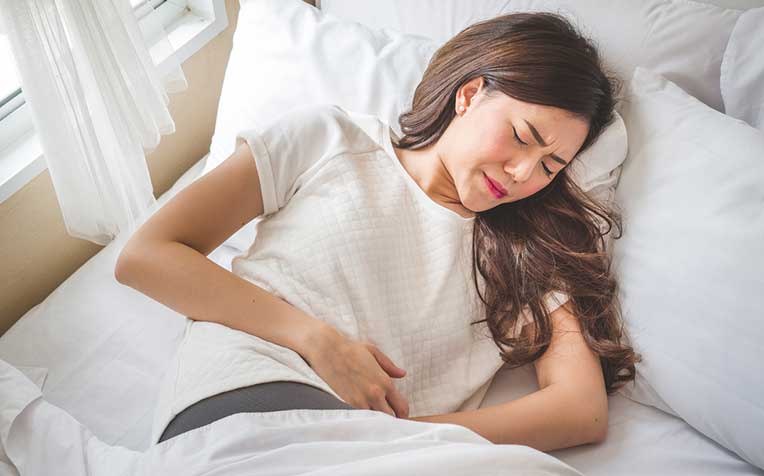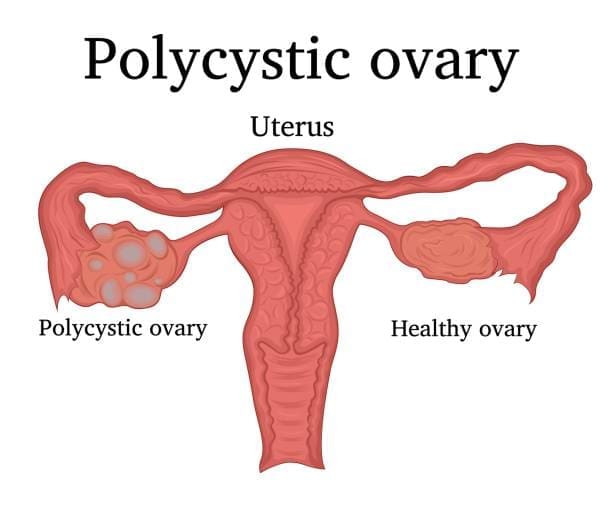
PCOD is a term that is often thrown around these days. Just like Diabetes, Fatty Liver, and Asthma, PCOD has become quite normal in today’s lifestyle – as normal as it can get. For people who are not familiar with the disease, Polycystic Ovarian Disease or more commonly known as PCOD is a hormonal disease that happens in women in their reproductive ages, resulting in enlarged ovaries with multiple small cysts found in them.
PCOD is one of the most common diseases affecting female fertility. According to recent surveys, one in every five women in India suffers from PCOD or PCOS, and the rate is rising steeply along with the constant changes in the lifestyle and dietary requirements of women. Without being monitored, the disease can later cause serious complications in a woman’s childbearing capabilities as well as other health challenges.
Here is a small guide to everything you need to know about the disease PCOD.

What exactly is this disease?
In females, ovaries are responsible to produce the female reproductive units, also called the Ova (singular Ovum) or the Eggs, and they are produced every month at an interval period of 15-20 days. Gradually the 2 eggs produced by each ovary mature inside the Graafian Follicle, and if it isn’t mixed with sperm, forming the Zygote, the eggs along with the follicle and the ephemeral tissues along the walls of the uterus start shedding through the process of menstruation. Maturing the Ova is an essential step for vaginal and uterine health. Here’s where PCOD becomes the issue.
PCOD is a disease, caused by hormonal imbalance, which leads to a physical disorder where ovaries produce many immature or partially mature eggs which gradually harden and turn into multiple cysts inside the ovaries. When this process repeats every month, the cysts gradually multiply resulting in the enlarging of the ovaries to an abnormal size. Besides, the presence of these immature eggs can lead to excessive secretion of the male hormone Androgen which causes menstrual irregularities and fertility issues in women.
This disease is pretty common though, and PCOD doesn’t have serious complications. Women suffering from the said disease can still be pregnant, having a completely healthy pregnancy cycle with medications.

The difference between PCOD and PCOS
Now, that’s a confusion almost every individual gets. As a PCOD patient myself, I have faced a lot of questions and overwhelming gasps following the name of the disease. For most people, the two diseases sound really similar with just a minor replacement of the ‘D’ with an ‘S’. But in reality, there is a grave difference in the severity of the diseases.
While Polycystic Ovarian Disease is where ovaries ovulate immature eggs, Polycystic Ovarian Syndrome (PCOS) is where anovulation happens, that is, ovaries stop producing eggs altogether. It can be assumed that PCOS is a much more severe form of PCOD that produces serious complications or even impossibility in a woman’s pregnancy. If a woman suffering from PCOS gets pregnant, there’s a severe risk of miscarriage or premature birth. PCOS can also lead to serious health challenges like Diabetes Insipidus (Type 2), High blood pressure, heart problems, and even Endometrial Cancer in later stages.
A highly neglected and untreated PCOD can gradually develop into PCOS.
PCOS is not as common as PCOD, and only 0.2 – 2.5% of the women population are affected by it.
Symptoms of PCOD.
The symptoms vary from person to person. The first and foremost symptom of PCOD is irregular menstruation. For some women, PCOD can cause an absence of menstruation for months, or even lead to abnormally heavy menstrual bleeding and intolerably painful period cramps – even more than normal cramps.
Weight gain is another common symptom of PCOD, where one gains an abnormal amount of weight too fast. And unfortunately, it is really difficult to get rid of the excess weight.
Due to the over secretion of the male hormones like Androgen and Testosterone, the appearance of acne and pimples are really common, along with excessive hair growth on one’s face, back, belly, limbs. But at the same time, while there’s excessive body hair growth, one also experiences too much hair fall with weak, brittle, and fragile roots of hair that are easily breakable. So… bye-bye, thick hair.
The irregularity in skin color is another symptom that one experiences in this disease. Skin darkens when one suffers from PCOD, resulting in skin discoloration especially in the neck, fingers, knuckles, knees, nipples, the underside of the breasts, and vagina. Saggy breasts can also be a symptom for most people with PCOD.

Apart from all the physical symptoms, a sense of lethargy will also be a sign of PCOD. Even a previously active person can start experiencing fatigue and exhaustion in this disease, causing overall displeasure towards any kind of physical activity.
Uh-oh, that is a problem, isn’t it?
What causes PCOD?
Unfortunately, the exact cause of PCOD ( and PCOS, for that matter) is still unknown. Though, the reason may vary from person to person depending on their lifestyle.
The main and most common reason for PCOD is the intake of junk foods. Apart from that, an unhealthy sleep schedule, prior diabetes problems, lazy lifestyle, and excessive stress levels are also major reasons for PCOD.
For some women, the cause might be genetic and from family heredity. Otherwise, PCOD is mostly a lifestyle disease.
Can PCOD be cured?
The answer to the question is, unfortunately, no. PCOD cannot be completely cured. Though with proper guidance and medication it can be reduced to an optimum level and can be controlled accordingly, it’s a disease that stays with a woman beyond their child-bearing age.
Since the disease is a lifestyle one, it doesn’t mainly depend on the medications but on how the individual is living. The more healthy the lifestyle is, the less are the chances for PCOD.
So, while there isn’t any permanent cure for this disease, there are, however, certain tips everyone should follow to control or restrict Polycystic Ovarian Disease.
Tips that everyone should know for controlling PCOD:
Here are certain tips that you should do to keep your PCOD to the minimum. Even if you don’t have the disease, it’s always better to be safe than sorry, right?
Exercise regularly:
Exercise is a vital, vital key to controlling PCOD. Keeping your body active and always on the move is a major step towards having a healthy lifestyle. Exercising can also cure the problem of irregular periods and lessens the painful cramps one might experience during menstruation. Make sure to do any kind of physical activity – it can be yoga, gym, dance, zumba, swimming, running, even walking – for a minimum of 20 minutes every day. Even if you are feeling lazy, just jump around. Move your body, in any way that’s possible.

Keep yourself thoroughly hydrated:
Fluids are essential for your body. Keeping your body hydrated is an important step towards dealing with this disease. And when I say this, I don’t mean just water. While water is certainly essential for good health, there are other beverages that help in PCOD.
Green tea is a very good fluid with the added benefit of antioxidants that increases your metabolism, help in weight loss, and also reduce insulin resistance and the amount of testosterone in women. Fruit juice is another beverage that helps – try to avoid adding sugar, though. Even a little amount of red wine is good for PCOD.
Sufficient intake of fruits and vegetables:
Try to eat at least one fruit and one vegetable every day. Fruits and vegetables provide the required nutrients, vitamins, antioxidants, and most importantly fiber. They build up the essential immunity of the body. But at the same time, make sure not to overeat fruits or vegetables. Too much fruit or vegetable at a time can also increase the level of carbohydrates and can be problematic.
Eat lots of protein:
Most PCOD patients overlook and ignore protein-rich foods because of their cravings for fatty, carbohydrate foods and sweets. But protein is an extremely necessary part of the diet that one can not miss without having the risk of worsening the PCOD. Eating a high-protein meal like eggs or chicken or bacon can work wonders. But at the same time, it is prudent not to over-consume protein. Dal is an ideal food to have in this condition.
Avoid restaurant and junk food:
Nooooooo….!
Well, yes.
Try to avoid as much junk, oily, rich, restro-made food as possible. A little amount of fat is healthy for the body but make sure that comes from homemade food and not the junk that everyone craves so much. It’s probably the most difficult and saddest thing to do. But in PCOD, one cannot have the luxury of being foody. Having an outside meal once a month? That’s okay. But frequently? That’s a no.
Avoid foods like Maggi, Chocos, high-sugar biscuits, chocolates…
Sustenance wins the race.
Quit smoking:
Cigarettes are the biggest catalysts for PCOD. Smoking, as addictive and pleasant as it may sound, can yield catastrophic results for someone suffering from this condition, bringing many complications and eventually turning it into a full-blown PCOS.
So, no smoking.

Fix your biological clock, and have a healthy sleep schedule:
That’s another thing to be kept in mind. Nocturnals are what we are now. And yet, try to have a healthy sleep schedule – sleep early, and rise early. That’s a good way to control your disease. The healthier your biological clock is, the less level your PCOD is.
Avoid skipping meals:
The common psychology of most people is to shed their weight by skipping meals and trust me, that’s not the way to do it. Instead of skipping meals, consume moderate amounts of protein, veggies, grains as a balanced meal.
Avoid Caffeine and any kind of stimulant:
While some articles and studies do say caffeine helps in modulating insulin resistance in women, it’s something that should be avoided as much as possible in the case of PCOD patients. Caffeine is a stimulant. PCOD is already caused due to hormonal imbalance, and drinking coffee or any kind of stimulant (Energy drinks) increases the level of hormonal imbalance as well as a rise in the secretion of the male hormones.
Develop vaginal hygiene:
Vaginal hygiene is a really important thing to do for not only women suffering from PCOD but also every other woman as well. PCOD patients are more prone to vaginal and uterine infections, though, and hence it is absolutely necessary for them to look after their private parts even more delicately.
Consult with a Gynecologist:
Lastly, follow up with your gynecologist, have regular check-ups and tests. Consult the required medications with your doctor.
PCOD might be a disease, but don’t let it turn into a problem. With the right amount of care and guidance, we can all overcome this condition very easily.

Be the first to comment